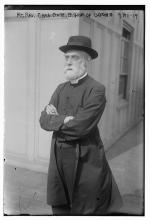Charles Gore was born in 1853 in Wimbledon to the Honorable Charles Alexander Gore, the brother of the fourth Earl of Arran, and to the daughter of the fourth Earl of Bessborough. He was educated at Harrow and at Balliol College, Oxford, and was elected fellow of Trinity College, Oxford, in 1875. From 1880 to 1883, he was vice-principal of the theological college at Cuddesdon and then, in 1884, when Pusey House was founded at Oxford as a home for Dr Pusey’s library and as a centre for the propagation of his thought, Gore was appointed principal, a title which he held until 1893. As principal of Pusey House, he held influence over undergraduates and the younger clergy, and it was greatly under his guidance that the Oxford Movement underwent a change, which to the survivors of the old school of Tractarians seemed to involve a break with its basic tenets. Puseyism had been in the highest degree conservative, basing itself on authority and tradition and repudiating any compromise with the modern critical and liberalizing spirit. Gore, for various reasons, found such an uncompromising attitude ineffectual, and thus sought to reconcile the principle of authority in religion—namely, the divine authority of the Catholic Church, which he held as an axiom—with that of scientific authority. In 1889, as part of his attempt to define the boundaries of these respective spheres of influence, Gore published two works: The Church and the Ministry, which serves as a vindication of the principle of apostolic succession in the episcopate against the Presbyterians and other Protestant bodies, and Roman Catholic Claims, a defence, couched in a more popular form, of the Anglican Church and Anglican orders against the attacks of the Romanists.
Later, in 1891, Gore delivered the Bampton lectures, in which he developed the doctrine of the Incarnation, which he had earlier enunciated in Lux Mundi, an edited collection of essays by different writers that sought to bring the Christian creed into right relationship with the modern growth of scientific, historical and critical knowledge. All said, the Bampton lectures led to a tense situation that was relieved in 1893, when Gore resigned his principalship and became vicar of Radley, a small parish near Oxford. In 1894, he became a canon of Westminster, and in 1898, he was appointed one of the court chaplains.
In 1902, Gore succeeded J J S Perowne as Bishop of Worcester, and in 1905, he was installed as Bishop of Birmingham, a new see, the creation of which had largely resulted from his efforts.
He died on 17 January 1932, and is usually commemorated as an English divine and Anglican bishop on January 23.
Overall, Gore’s work is remembered as ecumenical and connected with Christian Socialism, for he cultivated relations with the ministers of other denominations and actively worked against the sweating system, pleaded for European intervention in Macedonia, and supported the Licensing Bill of 1908.
Other works by Charles Gore include: The Creed of the Christian (1895); The Sermon on the Mount (1896); The Epistle to the Ephesians (1898); Romans (1899); The Body of Christ(1901); The New Theology and the Old Religion (1908); Orders and Unity (1910); Belief in God (1921); Belief in Christ (1922); The Holy Spirit and the Church (1924); The Doctrine of the Infallible Book (1924); and Christ and Society (Halley Stewart Lectures, 1927, pub. 1928).



